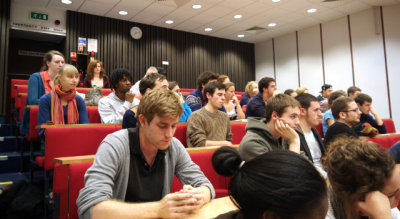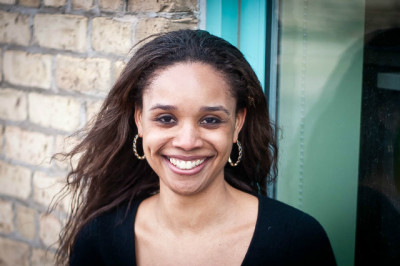'Black to School' Series Highlights Painful Experiences of Minority Students on Christian Campuses
Cleveland Provides Platform for Blacks to Discuss Racism at Predominantly-White Schools

Inspired by Anthony Bradley's latest book, Aliens in the Promised Land: Why Minority Leadership Is Overlooked in White Christian Churches and Institutions, social psychologist and popular blogger Christena Cleveland launched a "Black to School" series highlighting the experiences of black students at predominantly-white Christian colleges and universities.
Bradley's book, covered by The Christian Post in a series of interviews with the editor and three contributors, presents experiences, observations and solutions regarding racism and multiethnicity in Christian churches and institutions from the perspectives of black, Hispanic and Asian-American leaders.
"While reading the book, it occurred to me that current and recent black students at predominantly-white Christian colleges would likely benefit from hearing the stories of students who had shared their experiences, much like I benefited from hearing the stories of faculty members who had shared my experiences," writes Cleveland on her blog. The Disunity in Christ: Uncovering the Hidden Forces that Keep Us Apart author also mentions being the single African-American faculty member for two years at Westmont College, a Christian liberal arts school in California.
It was during speaking engagements on Christian campuses that Cleveland heard the varied but overlapping accounts of black students who were finding it difficult to enjoy what were supposed to be the best years of their lives.
"One of the most influential institutions within the mainstream evangelical Christian community in the United States is the Christian college," Cleveland recently told The Christian Post. "As I've spoken on Christian college campuses quite a bit and I've had talks with students who find my blog and my writing and my ideas (as) something that they're drawn to, I just keep hearing story after story after story of these really painful and negative experiences on Christian college campuses as students of color. The more I thought of it, the more I realized that there's just a very stark contrast between the experiences of students of color in general and the experiences of white students in general.
"You see white students who have these wonderfully, affirming and joyful experiences where they walk away really proud of their alma mater with these kind of warm fuzzy feelings. Then students of color – one of them described to me in an email last week that she's trying to do her Christian college detox because it was such a hurtful experience for her. It seemed to poison her identity as a black woman."
Maintaining campus diversity is definitely a concern among U.S. schools, and Christian colleges and universities are no exception. A basic Internet search brings up statements from Calvin College, George Fox University, Covenant College, Trinity Christian College, which ranks relatively high in campus ethnic diversity among regional colleges, and a slew of other Christian schools declaring their commitment to diversity.
The Council for Christian Colleges & Universities (CCCU), which has 173 members and affiliate colleges, universities and theological institutions from across the nation and around the world, heard from its current president this year that he was also committed to "racial and ethnic diversity and to the multiculturalism of Christian higher education."
The Washington, D.C.-based nonprofit began in 2000 to recognize CCCU members who make purposeful efforts to grow in areas of diversity, racial harmony and reconciliation on campuses.

Cleveland said her number one goal with the "Black to School: African-American Voices at Christian Colleges" series was to "affirm the students who are in the trenches, the students of color who are dealing with the alienation, the loneliness, the feeling left out, the marginalization, the stereotypes and prejudice."
"I want them to know that they're not alone and that their experiences are real and that there are other people in the United States who have experienced the same things. That's huge, just not silencing that voice, that experience," she explained.
The second goal was to raise awareness to get those who are in positions of power to simply pay attention, something which her "Black to School" series has already accomplished.
Cleveland, who earned her B.A. from Dartmouth College and Ph.D. from the University of California. said she received an email early on in the series from a person in a position of power at a Christian school. The man shared a document with her he said he planned to use to address the issues highlightd by the series on a larger scale.
"That's an answer to prayer and that's certainly something that was one of the goals of the series," Cleveland said. "My goal is that I get more and more of those stories, of people taking this information and saying this is unacceptable and we're going to make this an issue from now on."
Speaking in April at The Changing Faces Conference, an annual gathering designed to "empower, enable, encourage and enhance the service of Christian colleges to people of color," CCCU President Edward O. Blews, Jr. noted improvement among schools in their diversity.
According to the CCCU research team, 2001-2011 saw an increase across the board for student enrollment. Hispanic students were the largest area of growth (+134 percent), with Asian-American (+72 percent), black (+64 percent), Native-American (+29 percent), and white students following behind (+4 percent).
Blews also referenced Galatians 3:26-28 in his remarks at the conference.
"All of us [regardless of race or ethnicity] are baptized in Christ and clothed in His righteousness," he said. "We stand on equal footing before God through Christ. In that light we need to take stock of who we are and look forward to where we want to be."
Cleveland writes in the introduction of her "Black to School" series that both black and non-black classmates, faculty, staff, alums, parents, deans and college presidents could benefit from listening to the experiences of minority students.
"We must know each other's stories in order to begin to address the problem of race," she writes.
The "Black to School: African-American Voices at Christian Colleges" series was expected to conclude with suggested actions for change and improvement from Julie Park, a race, religion and higher education expert and author of When Diversity Drops: Race, Religion, and Affirmative Action in Higher Education.
The latest entry in Cleveland's series, part five, features the experiences of Drew Hart, a Ph.D. student studying Theology and Ethics at Lutheran Theological Seminary. As an undergrad at a Christian college in Pennsylvania, he encountered cases of racism and "cultural assaults."
Although he had managed to build relationships with other students on campus, Hart eventually found himself overwhelmed by the "subtle race issues" he previously had chosen to ignore.
"Each little cut on its own was unsubstantial, but by the end of my time there I found myself with a thousand paper cuts that hurt like hell. The ongoing racial prejudice on campus was more persistent and life-draining than anything I had seen in my life," he writes of his experience at the unidentified and mostly-white Christian college.
Cleveland, whose work involves equipping pastors and leaders and others of influence who are interested in tackling reconciliation across race, gender, class, education and theological lines, said the shared theme among the stories she has been highlighting is that each one is "heavily tainted." But there are some redemptive moments, she added.
In her upcoming book, Disunity in Christ: Uncovering the Hidden Forces that Keep Us Apart, Cleveland examines divisions among Christians and offers ways to build bridges.
"It's a book for anyone who is trying to figure out why it's so hard for Christians who are culturally different to come together, why it's so hard for us to be in the same room with people who disagree with us, why churches are so culturally homogenous, why it seems like a church with a different ethnic group down the street seems so different from us and why we tend not to connect with them," she explained. "I give the reader tools for crossing those bridges. Once we understand why they exist, then we can start to cross them."




























